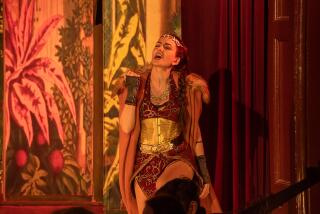Singers Lend Ancient Texts Modern Tone
- Share via
Paul Hillier calls his ensemble Theatre of Voices. It’s a catchy but curious name. Friday night these six singers, advertised (not inaccurately) as postmodern troubadours, offered little of anything resembling conventional theater during their program at UCLA’s Schoenberg Hall. They stood and sang. Nearly all the music was devotional; much of it was ancient and much of it was fragmentary. Texts were not distributed to the audience (just to the critics). But scanning the words wasn’t much help anyway when it came to works from the Middle Ages in which several different texts were sung simultaneously. Attention was drawn, instead, to the immaculate sonorities produced by these marvelous singers, trained in early music techniques.
In fact, Friday was an evening of drama, that of distant centuries bumping up against each other.
Hillier’s is but one of many very fine, early music ensembles that, in exploring history, get caught up in the creativity of attempting to realize scores too old to have a performing tradition. But what distinguishes Hillier is the degree to which this becomes an exciting leap into the modern. Arvo Part has written considerable music for Hillier (and he a book about the Estonian composer). Steve Reich has written for Theatre of Voices. Hillier has made a stunningly beautiful Harmonia Mundi recording of John Cage’s vocal music.
Friday’s program explored fragments in at least three senses: music from damaged or incomplete 14th century manuscripts, bits of larger works, and repertory that reflects the fragmentary nature of music history (especially the breakup of Christianity into Eastern Orthodox and Western Catholic traditions). And so, since everything was short, the audience was one minute hearing the Greek Orthodoxy updated by John Tavener (“Funeral Ikos”) and another minute hearing a 15th century Dufay motet that lamented the fall of Constantinople. One minute Cage’s “ear for EAR” (a calm chant by one singer echoed by another behind a scrim), followed by “O quanta qualia” (a hymn written eight centuries earlier by Peter Abelard).
Nothing jarred. Possibly it is the effortless way pure voices (soprano, countertenor, pairs of tenors and baritones) blend when little vibrato is applied. But the world and history sounded, during these two hours, very apprehensible. After a while, a listener hardly knew where he was. Kirsten Blase-Heilman--the striking, strong soprano--sang a solo, anonymous chant from 17th century Kiev so harmonically adventurous and otherworldly that I easily might have mistaken it for something written yesterday by a mystical Russian composer.
Hillier’s assembling of these many small pieces, wherever and whenever they were made and in whatever condition some have come down to us, formed a mosaic of a global village through space and through time. I thought not only of music history, but also of Robert Rauschenberg, Buckminster Fuller, Marshall McLuhan. It was a theater not just of voices, but also of consciousness.
More to Read
The biggest entertainment stories
Get our big stories about Hollywood, film, television, music, arts, culture and more right in your inbox as soon as they publish.
You may occasionally receive promotional content from the Los Angeles Times.











